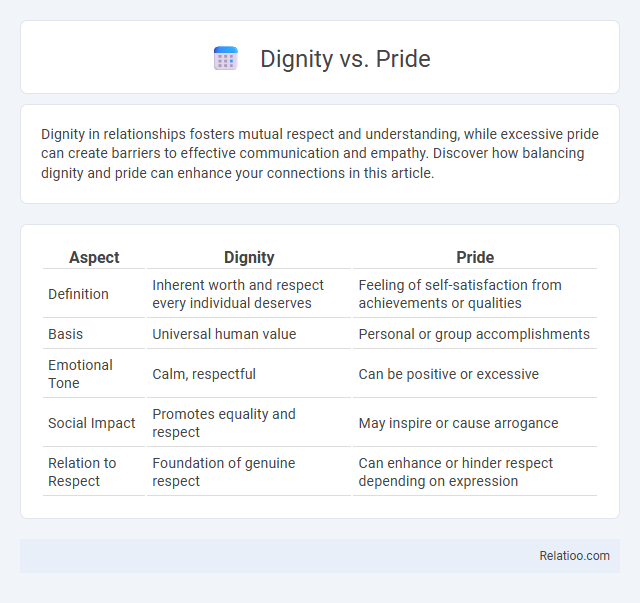Dignity in relationships fosters mutual respect and understanding, while excessive pride can create barriers to effective communication and empathy. Discover how balancing dignity and pride can enhance your connections in this article.
Table of Comparison
| Aspect | Dignity | Pride |
|---|---|---|
| Definition | Inherent worth and respect every individual deserves | Feeling of self-satisfaction from achievements or qualities |
| Basis | Universal human value | Personal or group accomplishments |
| Emotional Tone | Calm, respectful | Can be positive or excessive |
| Social Impact | Promotes equality and respect | May inspire or cause arrogance |
| Relation to Respect | Foundation of genuine respect | Can enhance or hinder respect depending on expression |
Understanding Dignity: Core Principles
Dignity refers to the inherent worth and respect every individual deserves, rooted in human rights and ethical principles, whereas pride often relates to self-esteem or personal achievements. Core principles of dignity include autonomy, equality, and respect, emphasizing that all people deserve fair and ethical treatment regardless of status. Understanding dignity requires recognizing its universal application beyond personal feelings of pride and is foundational to social justice and human interactions.
Defining Pride: Positive and Negative Facets
Pride embodies a dual nature, serving as both a positive affirmation of self-worth and a potential source of arrogance. Positive pride fosters confidence, motivation, and recognition of achievements, while negative pride can lead to hubris, entitlement, and strained relationships. Distinguishing pride from dignity helps clarify that dignity reflects inherent self-respect and moral integrity, whereas pride fluctuates based on accomplishments and external validation.
Historical Views on Dignity and Pride
Historical views on dignity emphasize inherent human worth and respect, rooted in philosophical and religious traditions that affirm every individual's intrinsic value. Pride has historically been seen in dual terms: as a positive sense of self-respect and cultural identity, or as a negative attribute linked to arrogance and hubris. Your understanding of dignity and pride can be enriched by recognizing these longstanding cultural and ethical distinctions that shaped societal norms and personal behavior through time.
The Psychology Behind Dignity
The psychology behind dignity involves an intrinsic sense of self-respect and worth that motivates individuals to maintain personal integrity and ethical behavior. Unlike pride, which often relates to external validation and achievements, dignity is rooted in an internal understanding of one's inherent value regardless of circumstances. Psychological research highlights that preserving dignity is crucial for mental well-being, fostering resilience and reducing stress in challenging social situations.
Pride in Modern Culture
Pride in modern culture often reflects a complex blend of self-affirmation, identity, and social belonging, serving as both a personal and collective expression of confidence and accomplishment. Unlike dignity, which emphasizes inherent worth and moral integrity, pride frequently highlights achievements and external validation, influencing societal values and behaviors. The interplay between pride and dignity shapes contemporary discussions around self-respect, cultural identity, and personal empowerment.
Dignity vs Pride: Key Differences
Dignity reflects your inherent worth and respect as a person, rooted in humility and self-respect, while pride often relates to a feeling of accomplishment or superiority that can sometimes lead to arrogance. The key difference lies in dignity being an intrinsic value that remains steady regardless of external achievements, whereas pride is typically contingent on specific successes or qualities. Understanding this distinction helps maintain your balanced self-esteem without tipping into excessive pride.
When Pride Becomes Harmful
Pride becomes harmful when it leads to arrogance, inflexibility, and a refusal to acknowledge mistakes or learn from others, damaging relationships and personal growth. Unlike dignity, which is rooted in self-respect and humility, toxic pride inflates the ego and creates barriers to empathy and collaboration. Maintaining dignity involves balancing self-worth with openness, preventing pride from turning destructive or isolating.
How to Cultivate Dignity
Cultivating dignity involves fostering self-respect, ethical behavior, and a consistent commitment to personal values that honor both oneself and others. Unlike pride, which can be tied to external achievements or ego, dignity is deeply rooted in humility and empathy, encouraging actions that uphold human worth universally. Practices such as mindful self-reflection, respectful communication, and embracing vulnerability help strengthen one's sense of dignity in daily interactions.
Balancing Self-Respect and Arrogance
Dignity reflects a fundamental sense of self-respect and worth that remains steady regardless of external validation, while pride can oscillate between healthy self-esteem and excessive arrogance. Balancing these concepts involves recognizing personal achievements without inflating one's ego, ensuring confidence does not morph into superiority. Maintaining this balance fosters authentic self-worth and respectful relationships.
Embracing Dignity Over Pride in Daily Life
Embracing dignity over pride in daily life fosters genuine self-respect and humility, allowing you to navigate challenges with grace and integrity. While pride often centers on external validation, dignity is rooted in an inherent sense of worth that remains steady regardless of circumstances. Prioritizing dignity cultivates deeper relationships and personal growth by encouraging empathy, forgiveness, and authenticity in all interactions.

Infographic: Dignity vs Pride
 relatioo.com
relatioo.com